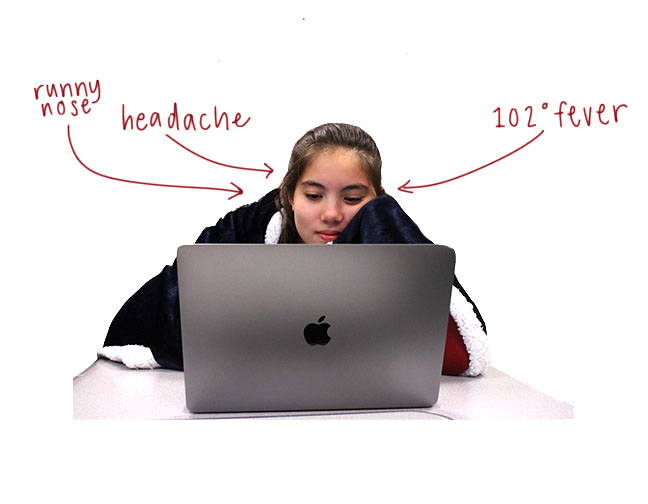Editorial: Reconsidering absence policies to accommodate student and staff needs
Many students choose to come to school even if they are sick due to fear of missing important school work.
December 11, 2019
With finals approaching and flu season rearing its ugly head, it becomes commonplace to see students struggling to maintain both their grades and their health. Eighty-six percent of 126 Lynbrook students surveyed indicated that they have prioritized academics over their own health in the past.
Lynbrook staff and administration generally agree that students should avoid coming to school when they are sick, as they could aggravate their health and also make other students ill. Nevertheless, some students toil through their classes, even when sick, mainly to avoid missing important school work since making it up can be difficult. In fact, eighty percent of the students surveyed agreed that making up work can be tedious, stressful and overwhelming. The school should work with its student body to create an environment in which students feel more comfortable missing school when necessary, whether they are suffering through physical sickness or need a mental break.
With regard to reasons for absence, eighty-three percent of those surveyed agree that mental health should be given equal priority to physical sickness. However, many students may not realize that mental health is considered an illness and can warrant an excused absence, similar to physical sickness. Teachers and school administration should explicitly address mental health and exhaustion as a legitimate reason to miss school. Without this confirmation, due to stigma about mental wellness within the community, students who require mental breaks from the stress of academic and extracurricular responsibilities might feel that their needs are invalid. Thus, these students may be pushed to falsely cite physical sickness as their reason for absence, rather than mental health, when discussing their absence with their teacher.
Further, some students may feel uneasy about communicating with teachers about absences and the process of making up work, in part because different teachers have significantly different absence and make-up policies. As a result, contacting each of their teachers can not only be laborious for students, but also can be intimidating and confusing. Additionally, students might not be unsure whether their specific health issue — be it mental or physical — is a valid reason to miss school, and consequently may feel hesitant about discussing an absence with their teacher.
Although there is a general consensus that teachers should provide students the number of days they missed to make-up work, there are no explicit guidelines that are easily visible on the Lynbrook website student handbook. Teachers are largely given autonomy in creating their absence and make-up policies, which range from very lenient to extremely strict. For example, one teacher may have a policy that allows students to make up assignments and tests within a few days or weeks of the absence, while another may require them to do so on the day they return. This causes a variation of methods through which students approach make-up work, with some taking advantage of lenient policies and others experiencing stress about the assignments they have to make-up.
In general, it is also important for both students and teachers to acknowledge that a day off is meant to be a time for rest and recovery, not a day to do more work. When students return to school after sickness, students have to focus not only on making up missed work and learning concepts taught while they were gone, but also on managing additional assignments. Doing so is a challenging task for any student, and even more so for students that are simultaneously trying to fully recover from an illness. Students should not feel the need to sacrifice the quality of their work or face earning lower scores because they fall sick.
Prompt and honest communication between the student and the teacher is imperative to solving this issue in an effective manner. Currently, students are responsible for contacting their teachers when they are absent, whether by email or by approaching them in person when they return. As a result, communication should be the primary focus when addressing absence and make-up work policies, as it is the first step to reducing any confusion that might arise among students.
Students’ health should be given priority — whether physical or mental— and addressing the issue of absences and make-up policies is one step in that direction. In the Epic’s next issue, the staff editorial will further explore the perspectives of students, teachers and administration as well as attempt to propose ideas to mitigate the current issues of confusion and stress that accompany missing school. The editorial will also aim to address any complexities that arise in the process of trying to provide solutions. Such complexities include the difficulties teachers face due to students’ lack of communication, the struggle with trying to make fair decisions between students, balancing leniency and strictness, and the potential pitfalls of a standardized, schoolwide absence and make-up policy.
* The Epic staff voted 38-0 in favor of this stance.
Read the continuation of this editorial here: https://lhsepic.com/7061/opinion/communication-clears-confusion-about-absence-policies/




































































Annika Kirpekar • Jan 15, 2020 at 11:09 am
I agree that when a student is sick and takes the day off or just needs a rest they shouldn’t have to do more work. They should take this time to rest and recover so they can get back to school. Student should also feel comfortable in taking a day off and not stressing about the amount of work and when it is due. Teachers should also let the student know what the process is when they are absent and allow the student to rest when they aren’t in school.